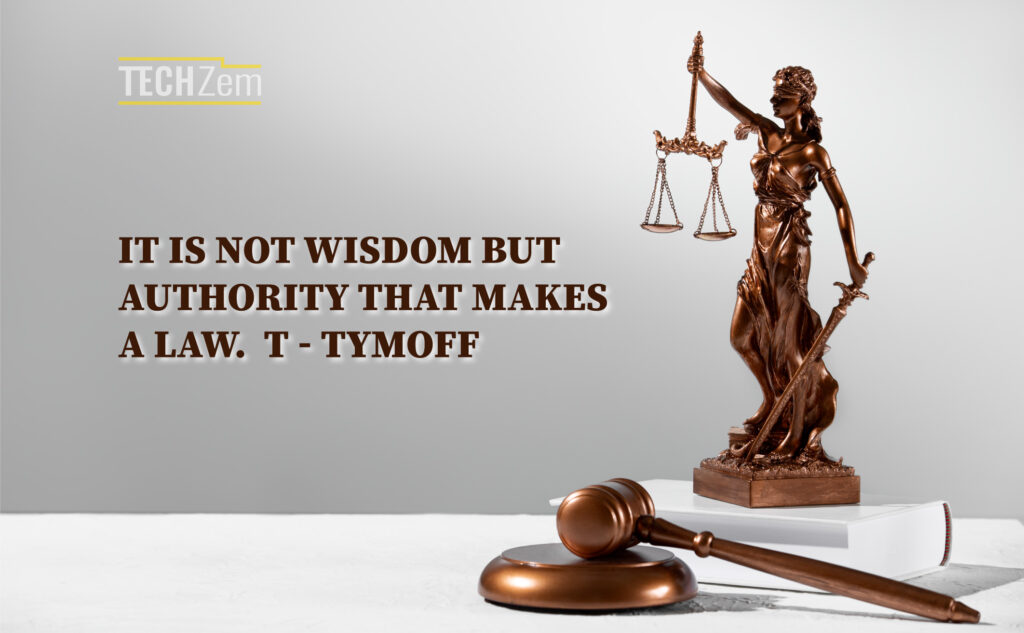Table of Contents
In our daily lives, laws guide almost every action we take, from the moment we wake up to when we go to bed. But have you ever stopped to think about what really influences the creation of these laws? Is it the collective wisdom of our society or the authority held by a few? The phrase “It is Not Wisdom but Authority that Makes a Law. t – tymoff” invites us to explore this intriguing question. In this article, we’ll delve into how authority, rather than wisdom, plays a central role in shaping the laws that govern us, examining the balance between these two forces from historical and modern perspectives.
The Historical Foundation of Authority in Lawmaking
Authority has been the cornerstone of legal systems since ancient times. This section explores the role of authority in historical legal systems and contrasts it with the role of wisdom, revealing how the power to make and enforce laws has often been concentrated in the hands of the few.
The Ideal Versus Reality: Wisdom in Lawmaking
While wisdom is idealized in the creation of laws, reality often paints a different picture. This part discusses the challenges of incorporating wisdom into lawmaking, highlighting cases where laws reflect the interests or agendas of those in power rather than wise, ethical considerations.
Why Authority Often Trumps Wisdom
This section delves into the reasons behind authority’s dominance over wisdom in legal frameworks. It examines the mechanisms through which laws are created and enforced, illustrating how authority, rather than wisdom, is often the primary driver behind legal decisions.
The Historical Foundation of Authority in Lawmaking
Throughout history, the creation and enforcement of laws have primarily been in the hands of those who wield authority. In ancient civilizations, such as Egypt, Rome, or China, the power to make laws was often considered divine or hereditary, vested in pharaohs, emperors, or kings. These leaders used their authority to decree laws that shaped their societies, with little input from the general populace.
The transition from monarchies to more democratic systems of governance has not diminished the role of authority in lawmaking. Even in modern democracies, elected officials and appointed judges hold the authority to create, interpret, and enforce laws. This historical reliance on authority highlights a continuous thread in the fabric of legal systems: the central role of power in shaping laws.
The Ideal Versus Reality: Wisdom in Lawmaking
Ideally, laws should embody the collective wisdom of society, reflecting ethical considerations, fairness, and justice. However, the process of lawmaking is often influenced by factors other than wisdom. Political agendas, economic interests, and the will of the powerful frequently drive legislative actions, sometimes at the expense of wise and just policies.
This discrepancy between the ideal and reality raises questions about the nature of the laws governing us. Are they truly meant to serve the greater good, or do they primarily serve to reinforce the authority of those in power? The challenge lies in ensuring that wisdom plays a significant role in lawmaking, guiding decisions towards the betterment of society as a whole.

Why Authority Often Trumps Wisdom
The dominance of authority over wisdom in lawmaking can be attributed to several factors. The mechanisms of governance, including the legislative, executive, and judicial branches, are structured in a way that emphasizes authority. Laws are passed by majority votes in legislative bodies, enforced by the executive, and interpreted by the judiciary. This structure inherently prioritizes the decisions of those who hold positions of authority, often sidelining the nuanced considerations that wisdom would dictate. “It is Not Wisdom but Authority that Makes a Law. t – tymoff” This saying underscores the reality that, in the complex dance of governance, authority often takes the lead, shaping laws in ways that might not always align with the collective wisdom or ethical considerations that ideally should guide lawmaking.
Furthermore, the urgent need for decision-making in governance sometimes necessitates swift action that authority can provide, while the deliberative nature of wisdom is slower and more contemplative. This urgency can lead to laws that are more about expedience than about the careful consideration of what is wise or just.
Modern Legal Systems and the Exercise of Authority
In modern legal systems, authority is exercised through a complex network of institutions and processes. The separation of powers between the legislative, executive, and judiciary branches is designed to prevent the concentration of too much authority in any one branch. However, this separation also reflects the central role that authority plays in the functioning of legal systems.
Legislators draft laws, the executive enforces them, and the judiciary interprets them. Each branch exercises its authority within the framework of the legal system, with checks and balances intended to prevent abuse. Yet, even within this system, the exercise of authority is key to the creation and application of laws, underscoring the challenge of infusing lawmaking with wisdom.
Balancing Act: Public Perception and the Legitimacy of Laws
The legitimacy of laws is deeply tied to public perception. When people believe that laws are created and enforced by legitimate authority and with wise intentions, they are more likely to respect and follow those laws. This relationship between authority, wisdom, and legitimacy is crucial for the effective functioning of legal systems. “It is Not Wisdom but Authority that Makes a Law. t – tymoff”
Efforts to enhance the perceived wisdom behind laws can include transparent lawmaking processes, public consultations, and the incorporation of ethical considerations into legislative debates. These efforts can help build trust in legal institutions and ensure that laws are seen as both authoritative and wise.
Wisdom’s Role in Shaping Just Laws
Despite the historical dominance of authority in lawmaking, there are notable instances where wisdom has guided the creation of laws. Legislation that protects human rights, environmental laws, and social welfare policies often stem from a deep understanding of human needs and ethical imperatives. These examples demonstrate that wisdom can and does play a crucial role in shaping laws that serve the greater good.
Conclusion
while authority is undeniably central to the creation and enforcement of laws, the pursuit of wisdom in lawmaking remains a noble and necessary endeavor. By striving for a legal system that balances authoritative decision-making with wise and ethical considerations, we can work towards a society governed by laws that truly reflect our highest ideals.

